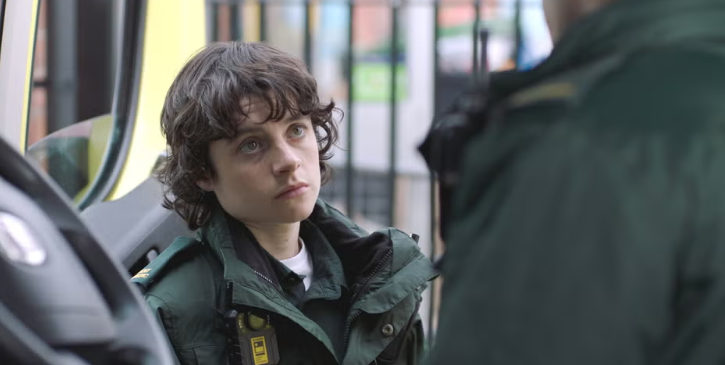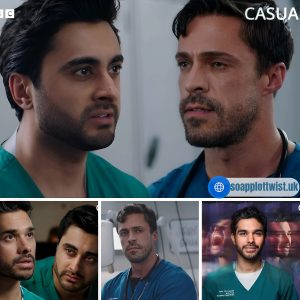The bustling, high-stakes environment of Holby City Hospital’s Emergency Department is a crucible where medical professionals not only face life-or-death situations daily but also navigate complex personal challenges. In recent narratives, student paramedic Indie Jankowski has seamlessly integrated into the demanding Casualty team, quickly demonstrating a promising aptitude for her role. However, beneath her composed exterior and professional ambition lies a deeply guarded past, a tapestry woven with financial hardship and profound family secrets that threaten to unravel her carefully constructed life.
Indie’s journey into the medical world is underpinned by significant personal struggle. Since the devastating loss of her grandmother, her primary source of stability and perhaps financial support, Indie has been grappling with considerable economic difficulties. This burden adds an invisible layer of pressure to her already demanding role as a student paramedic, making her desire to excel and secure her position within the ED all the more critical. Her ambition is not merely professional; it is intertwined with a desperate need for stability and security that has long eluded her.
The carefully maintained façade Indie presents to her colleagues faces an immediate and terrifying threat when a routine callout takes an unexpected turn. Dispatched to a local prison, Indie finds herself treating a patient who, to her horror, is none other than Samuel, her long-estranged father. Actor Naomi Wakszlak, who portrays Indie, describes this tense initial encounter as “quite sinister,” highlighting the immediate undercurrent of apprehension and unspoken history. For Indie, it’s a moment of profound internal conflict: the professional paramedic must attend to a patient, while the vulnerable daughter silently begs her father not to expose their intimate connection to her professional peers. Samuel, on the other hand, appears desperate for acknowledgement, creating a deeply uncomfortable and emotionally charged dynamic within the sterile confines of the prison infirmary.

This revelation forces viewers to confront the deeply complex nature of Indie’s past relationship with her father. It’s a history marked by disappointment and a relentless cycle of hope followed by letdown. Samuel has been in and out of prison throughout Indie’s childhood, a pattern that has undoubtedly shaped her perception of trust, reliability, and family bonds. Indie spent much of her formative years trying to see the best in him, striving to maintain some semblance of a stable relationship. Yet, as she matured and embarked on her university journey, a painful truth became undeniable: she simply wasn’t as important to him as he was to her. This realization, described as “horrible,” suggests a profound sense of abandonment and a deep-seated wound that continues to influence her present behaviour. Despite this hard-won acceptance of his limitations, a flicker of hope persists within Indie – a quiet, almost naive wish that he might yet choose to “do the right thing,” though she harbours significant doubt.
The profound need for secrecy stems from Indie’s lifelong experience of feeling fundamentally different from her peers. From academic struggles to financial disparities and a turbulent home life, she has consistently felt the need to conceal these aspects of herself. In the high-stakes, image-conscious world of medicine, this desire to hide her past is amplified. She yearns to prove her competence, to be seen as a reliable and trustworthy member of the team, and ultimately, to be accepted and respected by her colleagues. Indie believes that revealing her unconventional background, particularly her father’s criminal record, would undermine her professional credibility and expose her to judgment. She feels compelled to “mould into the best version of herself” – an idealized image that leaves no room for the messy realities of her personal history. This internal pressure to conform and excel is a significant driving force behind her actions and her profound anxiety about her secret being discovered.
The introduction of Samuel’s character is crucial to understanding Indie’s journey. Martin Hancock, who embodies Samuel, brings a compelling vulnerability to the role. This nuance is vital, as it complicates Indie’s emotional response. Despite the red flags and the history of disappointment, Samuel’s visible vulnerability can still evoke a glimmer of compassion and a desperate desire in Indie to offer him a second chance. This internal conflict – between the learned caution of her past and the lingering hope for a paternal connection – adds layers of complexity to her character and foreshadows potentially difficult choices ahead. The dynamic between actors Naomi Wakszlak and Martin Hancock, described as getting on “like a house on fire,” suggests a strong on-screen chemistry that will undoubtedly enhance the dramatic tension of their storyline.

The unfolding drama surrounding Indie’s secret has far-reaching implications for her professional and personal life within Holby ED. The constant fear of exposure creates an immense psychological burden, adding to the already stressful demands of her job. How will this hidden anxiety affect her judgment in critical situations? Will her preoccupation with keeping her secret lead to errors or moments of distraction that could endanger patients? The integrity of medical professionals is paramount, and the revelation of such a significant personal connection to a patient – particularly one with a criminal background – could easily call into question her impartiality and professionalism.
Furthermore, her secrecy creates a barrier between her and her colleagues. While she desperately craves their trust and acceptance, the very act of withholding such vital personal information could ultimately erode the foundation of those relationships if discovered. How will Jacob, her mentor, or other team members react if they uncover the truth? Will they view her as dishonest, or will they understand the deep-seated reasons behind her need for privacy? This storyline taps into universal themes of identity, the struggle for acceptance, and the weight of familial legacies. Indie’s journey is not just about a hidden father; it’s about her fight to define herself on her own terms, free from the shadow of her past, and to find a place where she truly belongs.
As the storyline progresses, viewers can anticipate the mounting pressure on Indie. Will Samuel actively try to re-enter her life, potentially disrupting her professional stability? How will her financial struggles intersect with this family drama, perhaps leading to desperate measures or increased vulnerability? “Casualty” has a long history of exploring the profound impact of medical professionals’ personal lives on their work, and Indie’s narrative promises to be a compelling example of this. Her battle for acceptance, her longing for a stable future, and the relentless ghost of her past will undoubtedly test her limits, forcing her to confront her deepest fears and perhaps, ultimately, to decide what kind of person – and paramedic – she truly wants to be. Her story is a poignant reminder that behind every uniform, there is a human being grappling with their own complex history, striving for a sense of belonging and peace.





